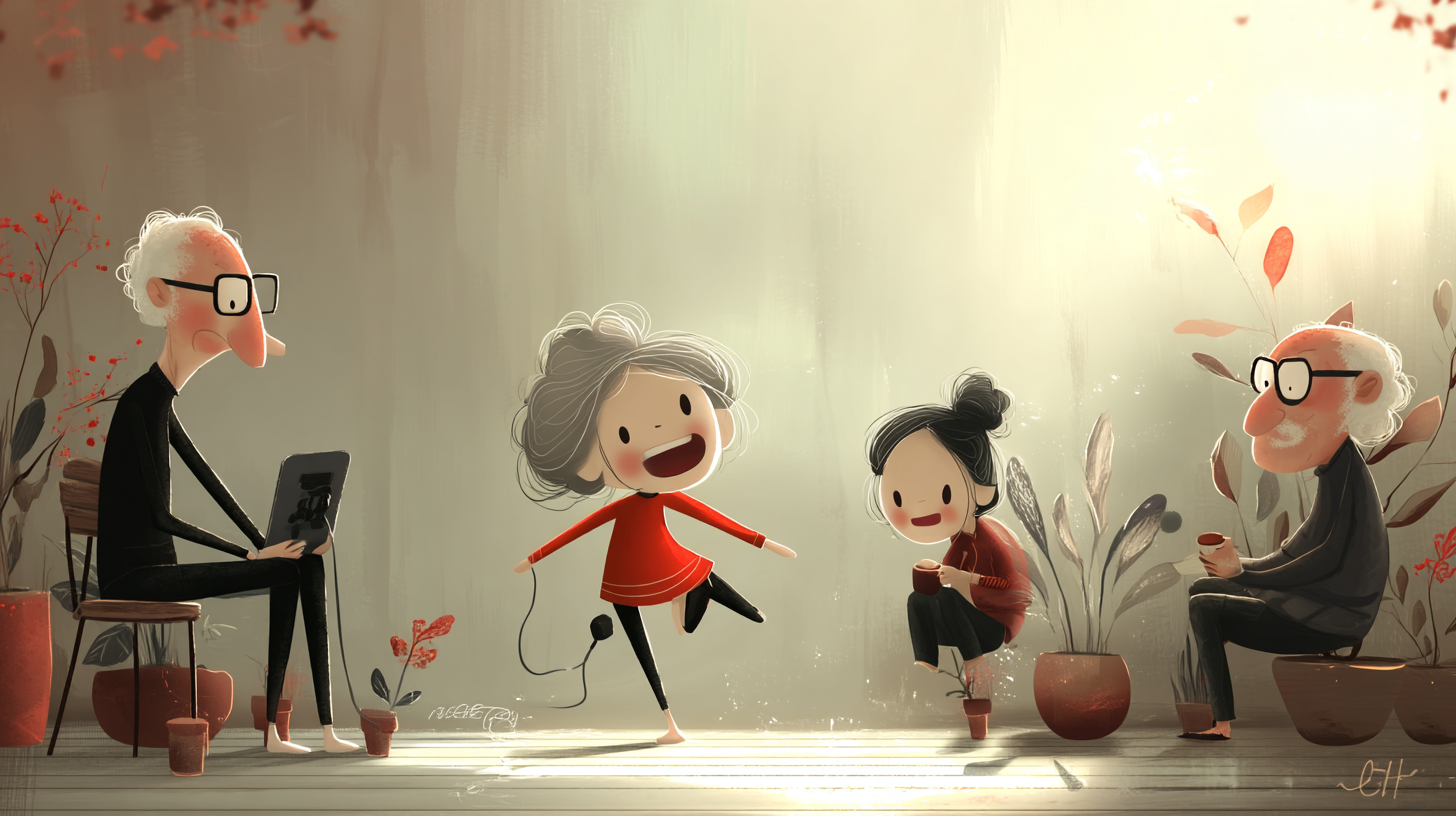To make people happy or interested by doing something fun.
人を楽しくさせたり、面白いことをして楽しませること。
以下は英単語 “entertain” に関するストーリー型学習コンテンツです。まずは大枠の意味を理解して最後の文章で確認しましょう。
主な意味(main meaning)
| 品詞 | 意味 | 発音記号 | 英語例文 |
|---|---|---|---|
| 動詞 (verb) | 楽しませる、人を楽しませることをする | /ˌen.təˈteɪn/ | The comedian entertained the audience with funny stories. |
語源(etymology)
語源: ラテン語 intertenere(間に保つ)→ 古フランス語 entretenir(保つ、維持する)→「人の気を引いて楽しませ続ける」という意味に。
核イメージ: 人の注意を引きつけて楽しく保つ。
類義語(synonyms)
| 類義語 | 英語例文 |
|---|---|
| amuse | The movie amused the kids a lot. |
| delight | The magician delighted the children with his tricks. |
| please | Her singing really pleased the audience. |
| engage | The speaker engaged the crowd with her powerful story. |
| charm | He charmed everyone at the party with his stories. |
反義語(antonyms)
| 反義語 | 英語例文 |
|---|---|
| bore | The long speech bored the students. |
| annoy | Loud music can annoy the neighbors. |
コロケーション(collocations)
| コロケーション | 英語例文 |
|---|---|
| entertain guests | She loves to entertain guests at her house. |
| entertain an idea | I’m not ready to entertain the idea of moving. |
| entertain children | The clown entertained children at the birthday party. |
| entertain at home | We often entertain at home on weekends. |
2項表現(binomials)
| 表現 | 英語例文 |
|---|---|
| fun and entertainment | The park offers fun and entertainment for all ages. |
| jokes and stories | He told jokes and stories all evening. |
英語ストーリー(english story)
Title: “An Entertaining Evening”
Last Saturday, Sarah invited her friends over to her home. She enjoys spending time with people and often entertains guests on weekends. Her goal that evening was to entertain everyone with fun and laughter.
She had prepared food, games, and even asked her brother to tell some jokes and stories. “You must make the kids laugh!” she told him. Her brother, who is good at amusing children, quickly agreed.
As the evening began, everyone gathered in the living room. The kids were especially excited. Sarah’s brother started with a magic trick, which delighted everyone. Then he told a funny story that charmed both kids and adults. The whole room was filled with laughter.
Sarah was pleased to see everyone having fun and being engaged. “This is exactly the kind of fun and entertainment I wanted to create,” she thought.
Later, her friend Tom said, “You really know how to entertain guests. I never felt bored for a second!” Sarah smiled. She had not only entertained children but also created a warm space where people could relax and enjoy.
As the guests left, one child said, “That was the best party ever!” Sarah knew her efforts had paid off.
和訳
タイトル:「楽しい夜」
先週の土曜日、サラは友達を自宅に招待しました。彼女は人と過ごすのが好きで、週末によく(entertain guests 客をもてなす)します。その夜の目的は、みんなを楽しく笑わせて(entertain 楽しませる)過ごしてもらうことでした。
食べ物やゲームを準備し、弟には(jokes and stories 冗談や話)を披露してもらうよう頼みました。「子どもたちを笑わせてね!」と彼女は言いました。子どもを(amuse 楽しませる)のが得意な弟は、すぐに承諾しました。
夜が始まると、みんながリビングに集まりました。子どもたちは特にワクワクしていました。弟は手品から始めて、みんなを(delight 喜ばせる)ました。その後、面白い話をして子どもも大人も(charm 魅了)しました。部屋中に笑い声が広がりました。
サラはみんなが(engaged 夢中)になって楽しんでいるのを見て嬉しくなりました。「まさに、こんな(fun and entertainment 楽しさと娯楽)を作りたかったの」と彼女は思いました。
後に、友人のトムが「君は本当に客のもてなしが上手だね。一瞬も(bore 退屈)しなかったよ!」と言いました。サラは笑顔になりました。彼女は子どもだけでなく、大人もリラックスして楽しめる空間を作れたのです。
帰り際、ある子どもが「今までで一番のパーティーだった!」と言いました。サラは努力が報われたと感じました。
Q&A
Q: 「entertain」と「amuse」の違いは?
A: 「entertain」は人を楽しませる全般を指し、食事や会話、パフォーマンスなど幅広く使われます。「amuse」は特に「面白がらせて笑わせる」ことに重点があり、軽くてユーモラスなニュアンスです。
Q: 「entertain」と「delight」の違いは?
A: 「entertain」は人の注意を引いて楽しませることに重点があります。一方「delight」は人を大きく喜ばせることに焦点があり、嬉しさや満足感が強調されます。
Q: 「entertain」と「please」の違いは?
A: 「entertain」は人を退屈させず、楽しませること。「please」は相手の希望に応えたり、心地よくさせることで、「満足させる」というニュアンスが強いです。
Q: 「entertain」と「engage」の違いは?
A: 「entertain」は楽しくさせること、「engage」は人の注意や興味を引きつけて夢中にさせることです。知的な話や深い対話には「engage」が使われやすいです。
Q: 「entertain」と「charm」の違いは?
A: 「charm」は相手の心を引きつける魅力で人を惹きつけること。「entertain」はもっとアクティブに楽しませる行為全体を指します。
Q: 「entertain guests」と「entertain children」の使い分けは?
A: 「entertain guests」は家に招いた大人などを楽しくもてなすこと、「entertain children」は子どもを対象に遊びやゲームなどで楽しませることです。
Q: 「entertain an idea」は他の意味?
A: はい、「entertain an idea」は「その考えを考慮する・検討する」という意味で、楽しませるという意味では使われません。抽象的な表現です。
Q: 「fun」と「entertainment」の違いは?
A: 「fun」は楽しさそのもの、主観的な感情です。「entertainment」は人を楽しませる活動やコンテンツ全体(映画、音楽、ショーなど)を指します。
Q: 「jokes and stories」はどんなときに使う?
A: 軽い会話の中で笑いや親しみを生むときに使います。「entertain」よりカジュアルで、内容そのもの(冗談や話)に焦点があります。



コメント